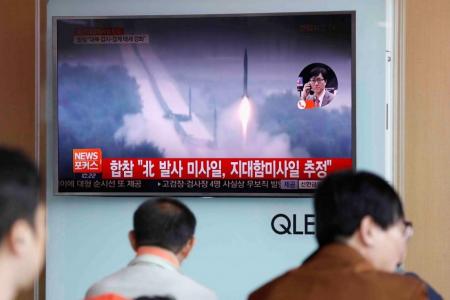No quick solution to missile mini-crises
North Korea's missile tests pose no imminent threat to the US
We need to put North Korea's missile tests in perspective. Yes, they are worrying. But the US mainland is not in imminent danger.
I have been in North Korea twice during periods of escalating tensions.
As a member of a non-profit organisation that trains North Koreans, I was there in the spring of 2013 when Pyongyang tested a nuclear device and sanctions followed, and the spring of last year, when it happened again.
I twice heard people there say that it was "too much, let's get it over with".
That harrowing phrase reflects how good North Korea is at keeping its population geared for conflict.
During previous mini-crises that have flared up on the Korean peninsula, I have also been in South Korea, where such "tensions" don't perk much interest.
You know the photo you see on the news of South Koreans huddled around TVs, watching the news about the latest missile launch or nuclear test?
That shot is almost always taken at Seoul Station. The viewers are not engrossed or tense. They are just waiting for a train. If football was on, they would be huddled around watching that.
Those sorts of images have Americans on edge, however. On July 4, Pyongyang tested the Hwasong-14 intercontinental ballistic missile.
Experts said it could reach Alaska or Hawaii. Three weeks later, the regime tested the missile again. It went further, putting much of the mainland US in range.
REALITY
The reality, though, is that Kim Jong Un doesn't have the capacity to strike the US first. Pyongyang knows its arsenal is too small - and always will be - to attack the US with a nuclear weapon and not face obliteration.
Even so, new dangers have emerged along with the North's new weapons.
Beyond the rhetoric, limited clashes have happened before along the border, on land and at sea.
The possibility of escalating upwards towards a full-blown conflict has always existed, but the difference now is that the end of the chain could include a missile attack on the US homeland.
In an emergency, the risk is that Washington would act more quickly to pre-empt such a scenario. In turn, if North Korea's leaders think a limited skirmish is escalating towards war or an attempt at regime change, they might think they are in a "use it or lose it" situation.
We don't know yet if North Korea's missiles and nuclear weapons make limited clashes or broader brinksmanship more or less likely.
Another concern is the spectre of a catastrophic technical or human error as tensions rise. On Sept 26, 1983, the Soviet Union's early warning system registered the launch of several American Minuteman intercontinental ballistic missiles. Duty officer Stanislav Yevgrafovich Petrov, with much trepidation, dismissed them as a false alarm. Had he followed standing orders to report them to the Soviet leadership, a retaliatory strike would have been almost certain.
A similar technical error today, but with North Korean soldiers less likely to think outside the box, could end differently.
The good news is that after 64 years, both sides of the conflict have grown adept at avoiding all-out war. And Washington does have other options to avoid going down that ugly road.
DISCIPLINE
Part of this is maintaining appropriate forces in the region, but part of it is also discipline and clarity in communicating that defence posture to Pyongyang and US allies South Korea and Japan. Inevitably, all responses carry some risks.
If Washington imposes more secondary sanctions to slow the pace of Pyongyang's weapons development, it risks friction with Beijing if Chinese businesses and banks come under scrutiny for possible ties to North Korea's military supply chains.
A freeze-for-freeze deal, wherein North Korea stops working on its missiles and nuclear devices in return for US concessions on military exercises, would carry both political and strategic risks.
The US can try to induce long-term behaviour changes in North Korea by supporting the positive economic and social changes taking place there.
This, however, means promoting exchanges and connections with North Koreans - difficult to balance with sanctions.
There will be no quick solution to any of this.
But for now, at least, Californians shouldn't fear that a North Korean missile is about to hit their shores. - REUTERS
Andray Abrahamian is an Honorary Fellow at Macquarie University, Sydney. The article has been edited for length.
Get The New Paper on your phone with the free TNP app. Download from the Apple App Store or Google Play Store now



